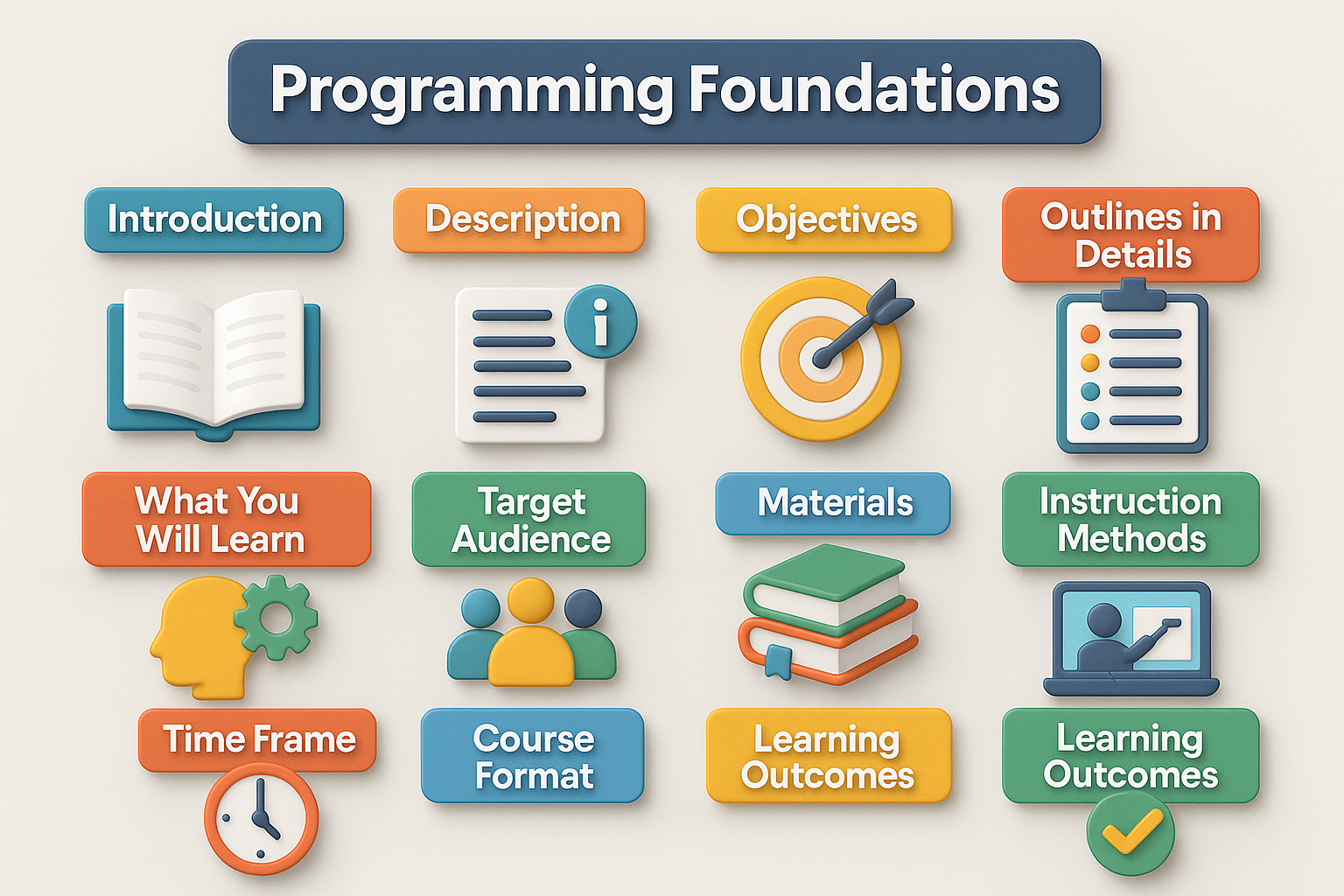
About Course
Programming Foundations
Code: 1085-P
Introduction
Programming Foundations is a comprehensive, entry-level course designed to introduce the core concepts of computer programming. This course establishes the fundamental principles necessary for future learning in computer science and software engineering.
Description
The course provides learners with a thorough grounding in programming logic, problem-solving strategies, and computational thinking. Emphasis is placed on algorithmic reasoning, structured programming, and hands-on practice with modern programming languages such as Python.
Objectives
-
To develop a conceptual understanding of programming and its role in software development.
-
To cultivate logical reasoning and systematic problem-solving skills.
-
To provide practical experience in writing, debugging, and analyzing code.
Outlines in Details
-
Introduction to Programming Concepts
-
Definition and history of programming
-
Overview of programming paradigms
-
Algorithms and flowcharts
-
-
Programming Environments and Tools
-
Installing and configuring programming environments
-
Introduction to IDEs (Integrated Development Environments)
-
-
Variables, Data Types, and Operators
-
Primitive and composite data types
-
Variable declaration and assignment
-
Arithmetic and logical operators
-
-
Control Structures
-
Conditional statements (if, else, switch)
-
Iterative structures (loops: for, while, do-while)
-
-
Functions and Modular Programming
-
Function definition, invocation, and parameter passing
-
Scope and lifetime of variables
-
-
Input/Output Operations
-
Console input/output
-
File operations (basics)
-
-
Error Handling and Debugging
-
Types of errors (syntax, runtime, logical)
-
Debugging techniques and tools
-
-
Introduction to Object-Oriented Programming (OOP)
-
Basic concepts: classes, objects, inheritance, encapsulation
-
-
Project Work
-
Implementing simple programming projects
-
Peer review and code presentation
-
What You Will Learn
-
The foundational principles of programming and computational logic
-
Step-by-step processes for developing algorithms and flowcharts
-
Skills to write, read, and debug code in a modern programming language (Python)
-
Strategies for modular and maintainable program design
Target Audience
-
University students pursuing computer science or engineering
-
Adult learners and professionals transitioning into programming roles
-
High school graduates preparing for technical higher education
Materials
-
Course textbook: “Programming Fundamentals” by Kenneth Leroy Busbee (OpenStax, Link)
-
Supplementary readings from peer-reviewed journals (see references below)
-
Access to a computer with Python installed
-
Online IDE (e.g., Replit, Jupyter Notebooks)
Instruction Methods
-
Lectures (face-to-face and online)
-
Guided lab sessions
-
Interactive coding workshops
-
Group discussions and peer code reviews
Time Frame
-
Duration: 8 weeks
-
Session Length: 2 hours per session
-
Frequency: 2 sessions per week
Course Format
-
Blended learning (combination of in-person and online instruction)
-
Flipped classroom for practical sessions
-
Weekly quizzes and coding assignments
-
Final project and presentation
Learning Outcomes
Upon successful completion, participants will be able to:
-
Explain core programming concepts and their applications in solving real-world problems.
-
Construct, analyze, and debug programs written in Python.
-
Employ basic principles of software engineering such as modularity and code reuse.
-
Critically assess program logic and structure for efficiency and correctness.
Course Content
Programming Foundations
Student Ratings & Reviews



